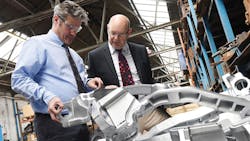Automotive demand is buoying the prospects for numerous metalcasting enterprises in North America, and some similar circumstances are coming to light for British foundries: automakers and Tier One suppliers demand for better engineered and lighter parts are the factors behind promising new research initiatives like the High Temperature Research Centre at the University of Birmingham, and the Constellation Centre at Brunel University London, as well as new foundry capacity, as recently announced by Magna International’s Cosma Intl. business.
But the good prospects are also apparent for at least one long-established enterprise that through diligence and preparation is forecasting that new opportunities in the automotive sector push it past £10 million (est. $14.5 million) in net sales over the next two years. Alucast Ltd., a producer of sand gravity and pressure castings in the West Midlands, aims to introduce £3 million (est. $4.5 million) worth of new product introductions, having impressed automakers and the Tier Ones with its quality and technical expertise.
Relying on Magmasoft® casting process simulation software for product design and process optimization, Alucast has been able to assume a greater role in designing and prototyping lightweight structural parts and this has already led to £500,000 (est. $725,000) in orders for a certain niche vehicle manufacturer.
Alucast also has taken the opportunity afforded by this new business to add to its management team, appointing Martin Haynes as its quality and technical director. Haynes is charged with delivering the world-class performance and new model introductions that are now shaping the foundry’s profile.
“There is a real momentum toward using aluminum in components, basically driven by the need to take weight out of vehicles,” explained John Swift, managing director of Alucast. “This is an area we have significant expertise in, and this has resulted in us being nominated for a lot of new work that we have gone on to win.
“The pipeline of opportunities is looking even better,” Swift offered, “and I’m confident we can hit £10 million (est. $14.5 million) by 2018.”
Swift continued: “As part of this drive, we are keen to reduce the age of the senior management team by bringing in some younger people, with fresh ideas. Martin has been a fantastic addition since joining as quality manager and has been instrumental in us securing and being re-accredited for TS16949.”
Alucast pours aluminum for parts in small volumes, including prototype work and special projects produced via sand casting, to medium-volume orders, and “high pressure” orders that may run to hundreds of thousands of components annually.
The foundry’s products may weigh just a few grams, or they may be large-dimension castings weighing up to one metric ton. It is able to respond to most requests for casting programs, for example automotive engine and chassis components, as well as hydraulic and vacuum pump bodies.
Alucast is a founding member of the Midlands Assembly Network. It has 98 employees, currently, at its plant in Wednesbury, and is on course to increase turnover by 10% this year to £7.7 million (est. $11.1 million.) The foundry is accustomed to ongoing capital investments, too: currently, Alucast is finalizing a £500,000 (est. $720,000) refurbishment plan for its machine shop and other facilities, including two five-axis CNC machines for finish-quality machining of cast parts. These additions also mean that Alucast will be able to speed up its delivery of castings to customers.
“Our drive for continuous improvement has really paid off, with our 10-strong quality team delivering outstanding manufacturing performance and ensuring we are competitive on price,” according to Haynes. “When you combine this with our ability to call upon Magmasoft, and a soon-to-be completed machine shop, we are in an ideal position to offer lightweight castings to existing and potential automotive customers.”
While Haynes came to metalcasting relatively recently, selecting it over an opportunity in religious education, he has been involved in manufacturing for nearly 30 years. Recently, he completed a course in Innovation Business Leadership, which should inspire some valuable insight and creativity in the coming business cycle.
“I’m delighted to be appointed as a director, five years after joining the firm,” he said. “It’s a fantastic business with great tradition, but now it’s our turn to deliver the next chapter in our history.”
In addition to investment in new technology and capital equipment, he’s also keen to ensure the workforce continues to have plenty of development opportunities.
“A few years back we put 73 of our staff through a comprehensive training program that delivered diplomas in Business Improvement Techniques and a host of Adult Apprenticeships. That commitment – the largest in our 49-year history – delivered over £235,000 (est. $340,000) of immediate savings and countless softer benefits of having higher skilled workers. Personal development is key to our business, people really are our power,” he affirmed.
